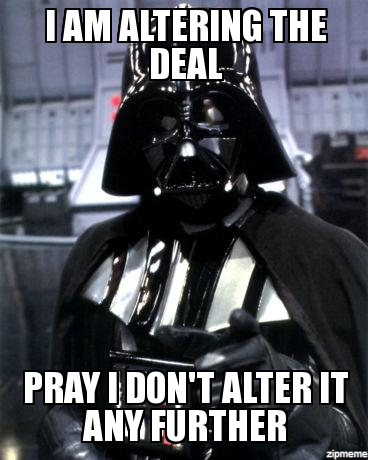If you’re a small online retailer in, say, Texas and a customer in Minnesota buys an item from you, should you be required to collect sales taxes for Minnesota? I would argue that it’s asinine to expect a small only retailer to be familiar with the sales tax laws of all 50 states but I’m not one of the Nazgûl so my opinion on the matter is irrelevant:
The 5-4 decision overturns a 1992 Supreme Court precedent that effectively barred states from collecting such taxes, and could leave consumers paying more for online purchases as cash-strapped states tap a rich vein of new revenue.
The icing on the cake, in my opinion, is the justification for the ruling. Usually the nine muumuu clad individuals who constitute the Supreme Court cite constitutional precedence to justify their rulings. For this case they appear to have just outright said that the previous ruling was inconvenient and therefore invalid:
In making their decision, justices ruled that South Dakota can collect sales taxes from online retailers like Wayfair, which was sued by the state. In doing so, the court reversed a 1992 ruling that allowed states to levy taxes only on those businesses with a brick-and-mortar location within the state. The court said that law effectively incentivized businesses to “avoid physical presence” in states and led to “a judicially created tax shelter.” Ultimately, the justices deemed the current law outdated.
“The Internet’s prevalence and power have changed the dynamics of the national economy,” Justice Anthony Kennedy wrote in the majority opinion. “The expansion of e-commerce has also increased the revenue shortfall faced by States seeking to collect their sales and use taxes.”
This illustrates one of my biggest gripes with nation-state legal systems. It’s difficult to operate in an environment where the rules can change on a whim. At any point your municipal, county, state, of federal government could pass a law that affects your business negatively. Moreover, if you do manage to fight the new law in court and win, you aren’t safe because a future court ruling could reverse the decision.
In this case online retailers have been operating on a 1992 Supreme Court precedent that said that state governments can only collect sales taxes from businesses within their borders. Today’s Supreme Court decided that its previous decision was inconvenient and changed the rules. Now states are free to collect sales taxes from retailers in other states. That means every online retailer now needs people on hand who are familiar with the sales tax laws in all 50 states. Tax specialists aren’t cheap so this decision will impact a lot of retailers negatively, possibly to such an extent that they will be forced to close up shop.

And to make it worse it’s not just 50 sales tax schemes, when you add all the county and local systems it’s over 10,000 different taxes to deal with.
Another re-distribution of wealth. Now, these businesses will have to hand over a portion of their income to either a tax specialist or a third-party selling platform, to manage the complex sales tax system. I predict a rise in the utilization of services like Shopify, which can assist in collecting and reporting sales tax for a business. This ruling helps a select group of people (government, brick & mortar retailers, accountants), and screws over the rest of us, both businesses and consumers alike.